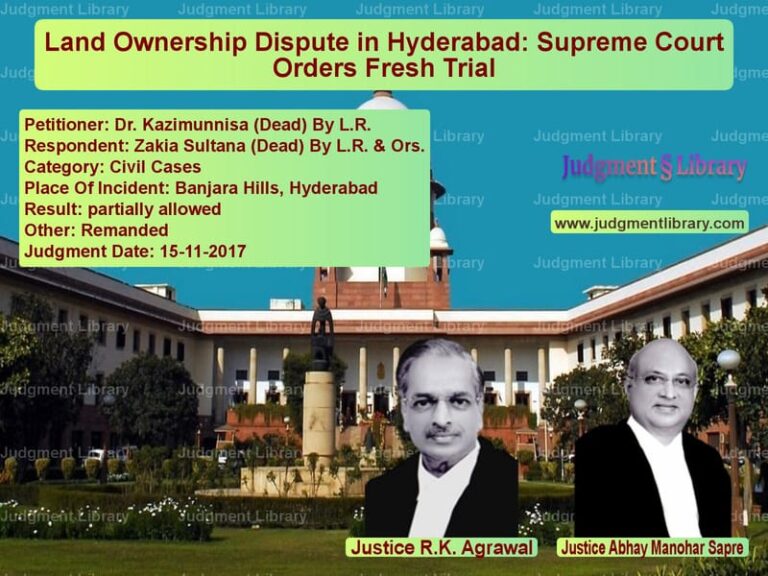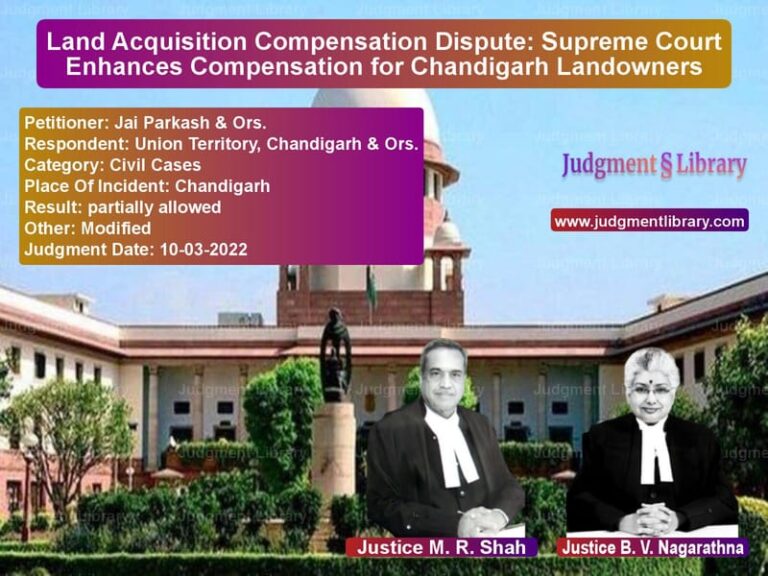Labour Dispute Settlement: Supreme Court Modifies Back Wages in Unlawful Dismissal Case
The case of The Management of Regional Chief Engineer P.H.E.D. Ranchi vs. Their Workmen revolves around the issue of unlawful dismissal of workmen and the extent of back wages to be awarded upon reinstatement. The Supreme Court had to decide whether the lower courts were justified in awarding full back wages after the termination of 37 workmen was declared illegal.
Background of the Case
The dispute arose when the Public Health and Engineering Department (PHED) of Jharkhand dismissed 37 daily wage employees. The workmen, represented by their union, challenged the dismissal before the Labour Court, arguing that it violated Section 25-F of the Industrial Disputes Act, 1947. The Labour Court ruled in favor of the workmen, ordering reinstatement with full back wages. The employer appealed against this decision, but both the Single Judge and the Division Bench of the Jharkhand High Court upheld the Labour Court’s ruling.
Dissatisfied with the outcome, the employer approached the Supreme Court, contending that awarding full back wages was excessive and that there was no proof that the dismissed employees were unemployed during the litigation period.
Arguments by the Petitioner (Employer)
- The employer argued that back wages could not be awarded as a matter of right upon reinstatement. The burden was on the employees to prove they had no alternative employment.
- The Labour Court had failed to consider whether the workmen had been gainfully employed elsewhere during the period of litigation.
- Full back wages for 37 workmen over a prolonged period was financially burdensome and unjustified.
- Judicial discretion should be exercised in determining the extent of back wages rather than awarding them automatically.
Arguments by the Respondents (Workmen)
- The workmen contended that their termination was unlawful and in violation of the Industrial Disputes Act.
- They argued that they were left without any means of livelihood after being dismissed.
- Since their dismissal was illegal, full back wages were the only just remedy to compensate for their wrongful loss of employment.
- The Labour Court’s decision was correct and should not be interfered with.
Supreme Court’s Observations
The Supreme Court analyzed the case by considering past precedents on the issue of back wages. The key observations included:
- Back wages are not an automatic right: The Court ruled that just because an employee’s termination is declared unlawful, it does not automatically entitle them to full back wages.
- Burden of proof on the employee: The workmen must prove they were not gainfully employed during the litigation period.
- Financial burden on the employer: The Court considered that granting full back wages to all 37 employees for a long period would place an unreasonable financial strain on the employer.
- Judicial discretion is necessary: The Court emphasized that courts must weigh factors such as employee efforts to find alternative work, employer’s financial capacity, and overall fairness.
Key Judgment Excerpts
The Supreme Court stated:
“The back wages could not be awarded by the Court as of right to the workman consequent upon setting aside of his dismissal/termination order. In other words, a workman has no right to claim back wages from his employer as of right only because the Court has set aside his dismissal order in his favour and directed his reinstatement in service.”
Further, the Court elaborated:
“It is necessary for the workman in such cases to plead and prove with the aid of evidence that after his dismissal from service, he was not gainfully employed anywhere and had no earning to maintain himself or/and his family. The employer is also entitled to prove it otherwise against the employee.”
Final Judgment
- The Supreme Court allowed the appeal in part.
- The Court modified the lower court’s order and awarded only 50% of the back wages instead of full back wages.
- The employer was directed to compute and pay the amount within three months.
- The Court exercised its powers under Article 142 of the Constitution to ensure a fair balance between the rights of the employees and the financial constraints of the employer.
Conclusion
This judgment reinforces the principle that while reinstatement is a rightful remedy for unlawful dismissal, back wages should not be granted automatically without considering factors such as financial burden on the employer and proof of alternative employment for the dismissed workmen. The ruling strikes a balance between the interests of both parties, ensuring fair compensation without imposing undue hardship on the employer.
Petitioner Name: The Management of Regional Chief Engineer P.H.E.D. Ranchi.Respondent Name: Their Workmen Rep. by District Secretary.Judgment By: Justice Abhay Manohar Sapre, Justice S. Abdul Nazeer.Place Of Incident: Ranchi, Jharkhand.Judgment Date: 20-09-2018.
Don’t miss out on the full details! Download the complete judgment in PDF format below and gain valuable insights instantly!
Download Judgment: The Management of Re vs Their Workmen Rep. b Supreme Court of India Judgment Dated 20-09-2018.pdf
Direct Downlaod Judgment: Direct downlaod this Judgment
See all petitions in Employment Disputes
See all petitions in Termination Cases
See all petitions in Disciplinary Proceedings
See all petitions in Judgment by Abhay Manohar Sapre
See all petitions in Judgment by S. Abdul Nazeer
See all petitions in partially allowed
See all petitions in Modified
See all petitions in supreme court of India judgments September 2018
See all petitions in 2018 judgments
See all posts in Service Matters Category
See all allowed petitions in Service Matters Category
See all Dismissed petitions in Service Matters Category
See all partially allowed petitions in Service Matters Category







